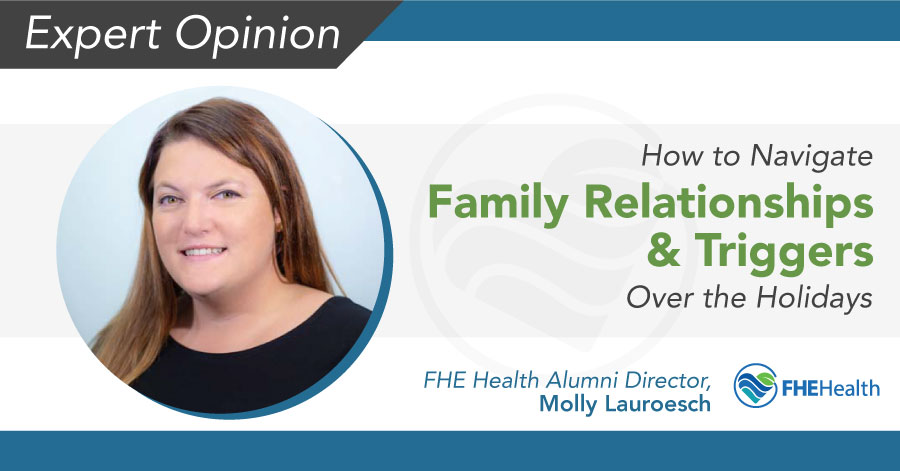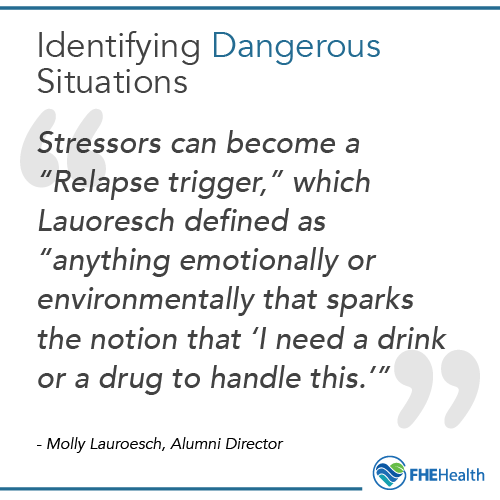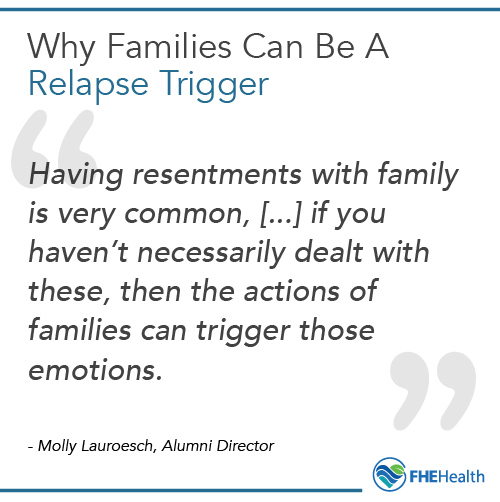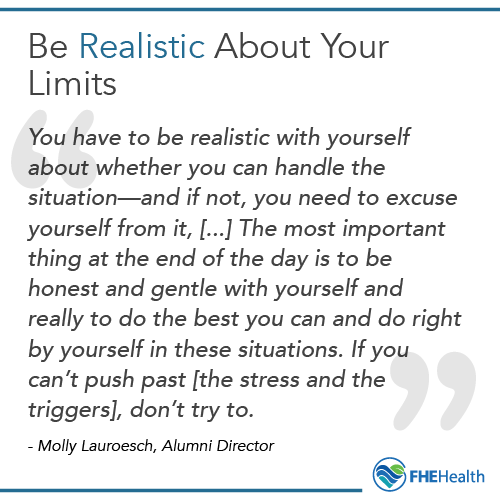
The holidays are synonymous with many things. For many of us, celebrating around the Thanksgiving table or opening presents on Christmas morning would not be complete without the presence of family and loved ones. Yet it’s also the case that for many of us, celebrating the holidays with family can be stressful— to the degree that we’re familiar with the expression, “family triggers me,” and may even have used it to describe ourselves.
If that’s you, you’re not alone. A majority of Americans find it stressful to navigate family and the holidays. In fact, feeling stressed on holidays is now more the norm than not: 88 percent of Americans said they feel stressed when celebrating the holidays, according to a 2017 poll cited by Fox News.
For people in early recovery, the holidays can present unique family triggers that add a whole new layer of stress to the season. If these issues are not attended to or managed effectively, they can jeopardize a person’s sobriety and hijack their recovery. It’s therefore imperative that people in early recovery know how to effectively navigate that stress.
For insights into this question, we consulted Molly Lauroesch, the director of alumni at FHE Health. Lauroesch regularly coaches alumni who are dealing with just these sorts of challenges. In a recent interview, she shared some helpful stress relief and relapse prevention tips for anyone in early recovery who may be making plans to see family over the holidays….
Causes and Types of Holiday Stress in Recovery
 People in early recovery face the same family triggers that plague the rest of us— and then some. To be sure, there are the more typical, family-related stressors and pressures. Types of holiday stress can include things like traveling to see family over the holidays, hosting family gatherings, handling social interactions (and avoiding hot-button issues) and budgeting for the added financial expenses of the season.
People in early recovery face the same family triggers that plague the rest of us— and then some. To be sure, there are the more typical, family-related stressors and pressures. Types of holiday stress can include things like traveling to see family over the holidays, hosting family gatherings, handling social interactions (and avoiding hot-button issues) and budgeting for the added financial expenses of the season.
Another common cause of stress over the holidays: the unrealistic expectations that we can bring into these contexts. When we’re expecting only fun and happiness from these times with family, that expectation itself can create more pressure and the likelihood of a letdown, including negative effects on our mental health.
But for people in recovery, the holidays can be rife with still other mental and emotional landmines that could detonate at any moment. Some examples of these family-related relapse triggers, according to Lauroesch:
- Being around loved ones who are drinking, especially if the event is a big drinking affair
- Returning to an addict or alcoholic’s home (ex: if your mom or dad is in active addiction)
- Being back in the same environment where you used to drink or got high (your bedroom, certain streets, etc.)
- Encountering a family member who was abusive towards you, whether physically, sexually or emotionally
- Memories of all of the past holidays that you weren’t able to be present for because of a substance abuse problem
- Negative emotions regarding your family
- And, social anxiety.
Meanwhile, the stakes are higher for those facing these types of holiday stress. Any one of these stressors can become a “relapse trigger,” which Lauoresch defined as “anything emotionally or environmentally that sparks the notion that ‘I need a drink or a drug to handle this.’”
She emphasized that there’s usually a strong “emotional component” to these family-related triggers. For example, “having resentments with family is very common,” and “if you haven’t necessarily dealt with these, then the actions of families can trigger those emotions.”
 Holiday Mental Health and Stress Relief Tips for People in Recovery
Holiday Mental Health and Stress Relief Tips for People in Recovery
Lauroesch offered a number of mental health and stress relief tips for managing these sorts of triggers:
- Identify your triggers ahead of time. Knowing what your triggers are can help you decide ahead of time whether you can manage them or whether you need to go with a Plan B that does not involve being around family over the holidays. Self-awareness about triggers is also critical in the development of an effective relapse prevention plan which you can take with you when you’re in potentially triggering situations. Having a set of pre-planned steps to follow for when temptation strikes can be half the battle in staying sober.
- Be gentle with yourself, by accepting your limits. “You have to be realistic with yourself about whether you can handle the situation—and if not, you need to excuse yourself from it,” Lauroesch said. “The most important thing at the end of the day is to be honest and gentle with yourself and really to do the best you can and do right by yourself in these situations. If you can’t push past [the stress and the triggers], don’t try to.” She emphasized that sometimes a healthy understanding of one’s limits means not going to see family over the holidays. The alternative: “If you’re in a recovery community, then there are undoubtedly people in the same situation; so rather than go to a family gathering, try to organize a potluck among friends. That way you’re around sober people instead.”
- Reframe negative associations as opportunities for reflection and gratitude. “So many people have stories of holidays in the past when they have been heavily under the influence, so having a calendar reminder of your past can be upsetting in itself,” Lauroesch said. As an alternative to wallowing in these negative memories and emotions, she recommended taking a moment for reflection and gratitude: “Yes, maybe last Thanksgiving you were a complete mess … you have to remember that that’s not the person you are now.” Similarly, “If you’re fortunate enough to be invited to a holiday gathering, stay in a spirit of gratitude about that and remember that you might not have been invited in previous years or that you were included this year. Be grateful for the opportunity that you’re wanted and for second chances.” The bottom line: “If you’re in a situation with your family, you can use it as an opportunity to show how you’ve changed and continue with the living out of your amends and trying to do right by your family going forward.”
 Utilize your support system. This is “a big component” of taking care of both your sobriety and mental health. “If you’re living here in Florida and you’re back home in New Jersey for the holidays, making sure that you have supports that you can call when you’re dealing with a difficult situation is important,” Lauroesch said. “If you need to take a minute to call your sponsor, that’s a good tool to have. Along with that, if you’re part of some sort of fellowship, looking up meetings in the area—so that way if you need an escape location you have somewhere to go—is a good idea.”
Utilize your support system. This is “a big component” of taking care of both your sobriety and mental health. “If you’re living here in Florida and you’re back home in New Jersey for the holidays, making sure that you have supports that you can call when you’re dealing with a difficult situation is important,” Lauroesch said. “If you need to take a minute to call your sponsor, that’s a good tool to have. Along with that, if you’re part of some sort of fellowship, looking up meetings in the area—so that way if you need an escape location you have somewhere to go—is a good idea.”- If you have the type of relationship with your family where you can be open about your triggers ahead of time, do that. “For instance, if your mom normally keeps all the liquor out on the counter during holiday celebrations, you can say ‘Mom, that’s going to make me feel uncomfortable. Can we put the liquor in the cabinet?’” Lauroesch added that she knows families who have respected requests for “a dry Thanksgiving.” She advocated setting these sorts of boundaries ahead of time, wherever possible.
- Play the tape. If you get triggered and start to think you need to drink or use a drug, Lauroesch recommended “playing the tape.” It’s a standard piece of advice that has helped many people in recovery fend off relapse. In a moment of temptation, pause for a few moments to reflect on how drinking and doing drugs has hurt you in the past and will hurt you again if you succumb to the cravings. Just some momentary reflection can create enough distance for you to call your sponsor for support or escape to an AA meeting.
- Be intentional about maintaining a healthy recovery lifestyle— even if it is the holidays and you’re with family. If you have to be with family over the holidays, knowing full well they can be triggering, Lauroesch suggested these precautions:
-
- “Getting your coping tools organized before you leave, so making sure to let your supports know— so that way you can find out who may be accessible to call if you need them”
- “Looking up local fellowships in the area for you to lean on”
- Practicing a daily meditation (praying in the morning, writing letters to your Higher Power at night, etc.) – Here Lauroesch suggested packing a devotional that you can take with you, such as AA Daily Reflections, Jesus Calling or Al Anon’s Courage to Change.)
- An afternoon run – “If that helps to keep you centered, then make a point to do that.”
Ultimately, there is more than one mental health key to managing holiday stress and navigating family triggers. The secret is finding the keys that work for you this holiday season.






